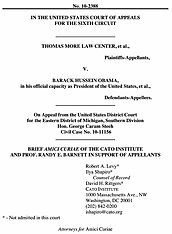Thomas More Law Center v. Obama
Learn more about Cato’s Amicus Briefs Program.
The legal battle against Obamacare has hit the appellate court level. In October, a district court in Detroit granted the government’s motion to dismiss a lawsuit brought by the Thomas More Law Center and four individuals. The judge there endorsed the government’s theory that federal power under the Commerce Clause could reach the decision not to buy health insurance because that decision had a substantial effect on interstate commerce. The plaintiffs have appealed that ruling to the U.S. Court of Appeals for the Sixth Circuit, and Cato, joined by Georgetown law professor (and Cato senior fellow) Randy Barnett, filed a brief supporting that appeal. We argue that the outermost bounds of existing Commerce Clause jurisprudence — the “substantial effects doctrine” — prevent Congress from reaching intrastate non-economic activity regardless of whether it substantially affects interstate commerce. Nor under existing law can Congress reach inactivity even if it purports to act pursuant to a broader regulatory scheme. Even the district court recognized that “in every Commerce Clause case presented thus far, there has been some sort of activity. In this regard, the Health Care Reform Act arguably presents an issue of first impression.” What Congress is attempting to do here is quite literally unprecedented. “The government has never required people to buy any good or service as a condition of lawful residence in the United States.” Cong. Budget Office, The Budgetary Treatment of an Individual Mandate to Buy Health Insurance 1 (1994). Nor has it ever said that people face civil penalties for declining to participate in the marketplace. Even in the seminal New Deal case of Wickard v. Filburn, the federal government claimed “merely” the power to regulate what farmers grew, not to mandate that people become farmers, much less to force people to purchase farm products. Finally, even if not purchasing health insurance is considered an “economic activity” — which of course would mean that every aspect of human life is economic activity — there is no legal basis for Congress to require individuals to enter the marketplace to buy a particular good or service. It is no more “proper” under the Necessary and Proper Clause for the federal government to “commandeer” individuals than to “commandeer” state officials.

This work is licensed under a Creative Commons Attribution-NonCommercial-ShareAlike 4.0 International License.





